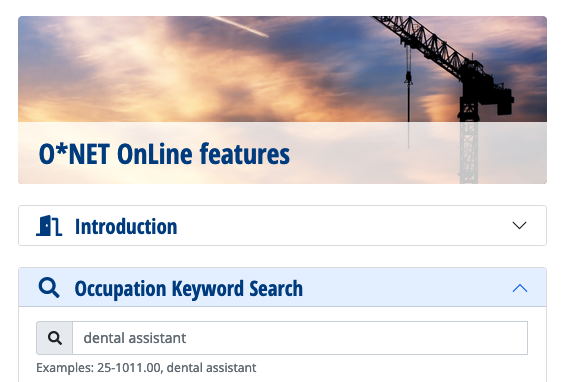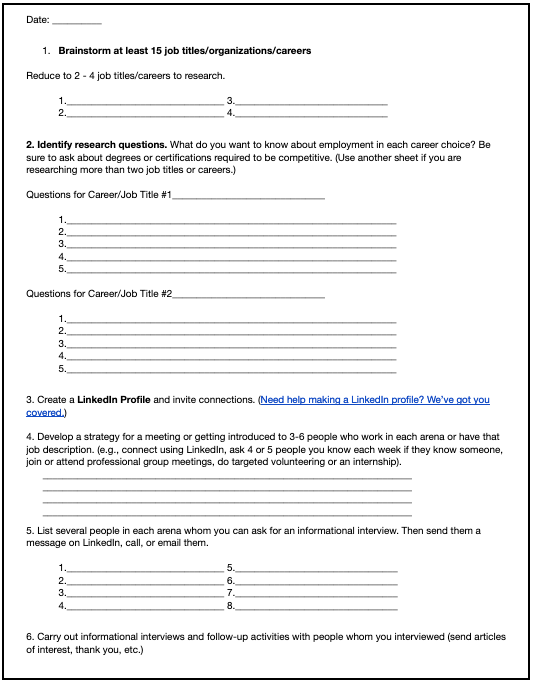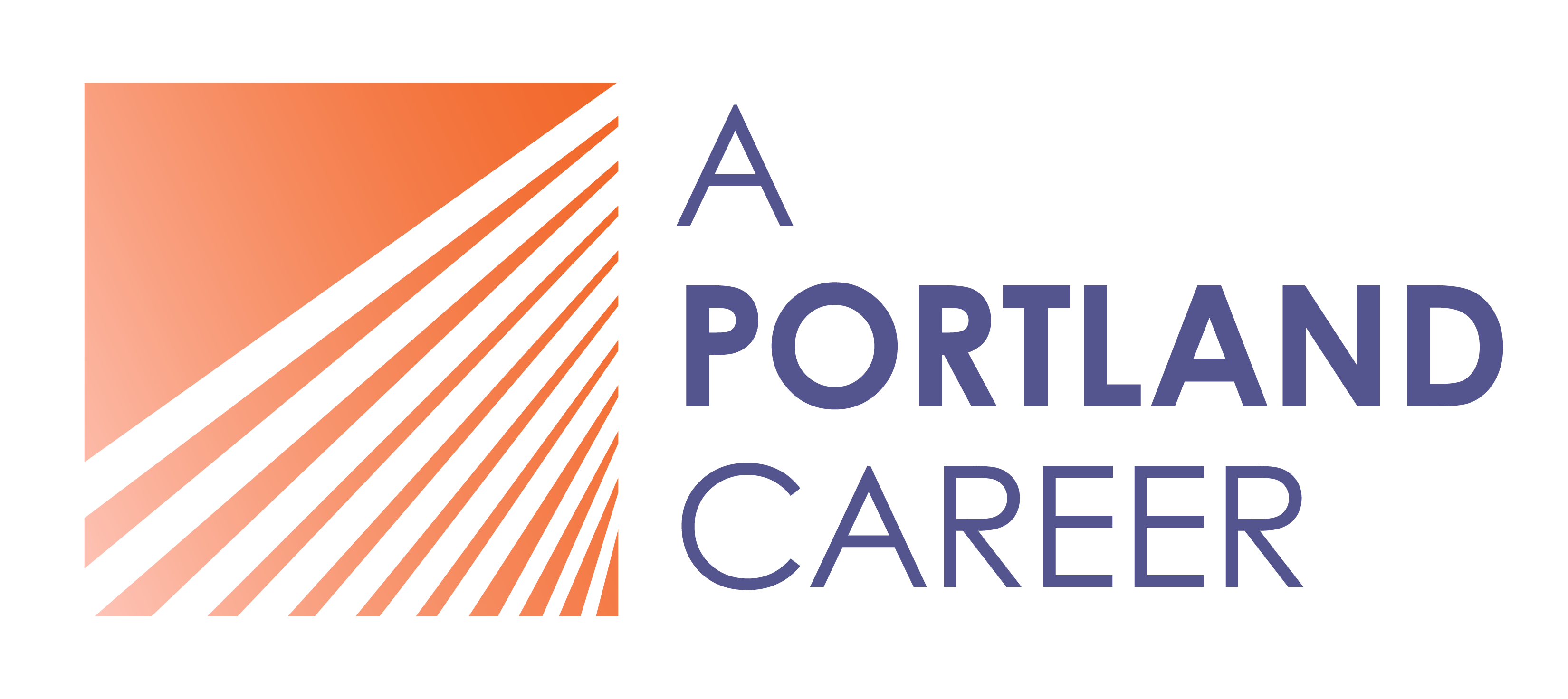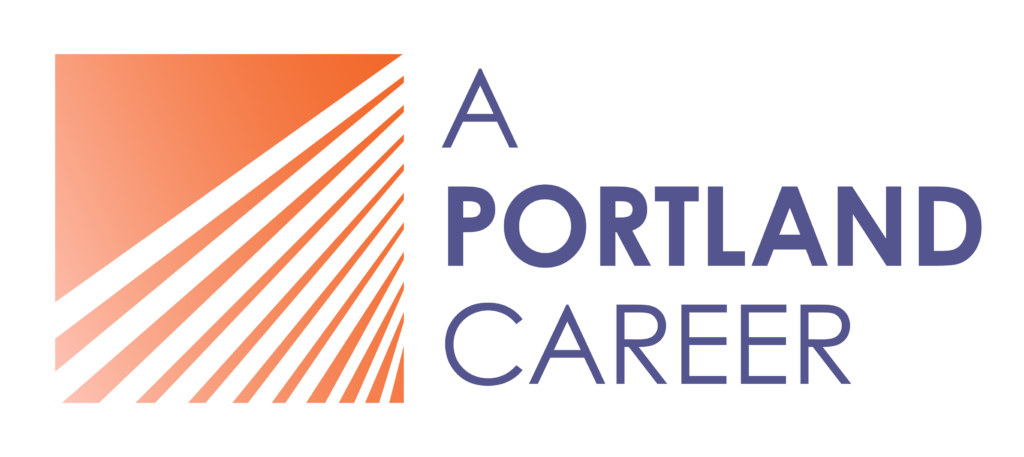Deciding on a career path can feel overwhelming, but with clear objectives, solid self-assessment, and a healthy trust of your gut instincts, you can do this thing!
Here’s 7 of our best tips to take your career exploration from brainstorm to organized search. Narrow down job titles, tap your network, and find the right research tools!
7 Expert-Backed Research Tips to Find the Right Career
By Dan Hahn, M.S., and edited by Jelena Grove, Dan Hahn, and Suzie Sherman
Overwhelmed by career options? We can help you narrow down your search

The first step in the process of career searching is self-assessment: reflect on what you care about, the skills you possess, things you enjoy doing, what brings you fulfillment, and what you would like your life to be like. Once you’ve got those down, it’s time to create an action-oriented framework to see how your values, personality, skills, and interests intersect with the world of work.
In this post, we present you with 7 expert-backed research tips to find the right career: a series of keys to unlock the many doors in the vast hallway of work. Whether you’re looking for a career change or considering a first job out of college, it’s important to know how to approach the career research you’ll need to do to get to where you want to be in your work.
A planned, careful career exploration like the one you’ll learn to do in this post will help you pace yourself, get the best information possible, yield impressive results in your job search, and maybe enable you to find some enjoyment in the process.
Home → Helpful Articles → Career Exploration → 7 Expert-Backed Research Tips to Find the Right Career
If you’re wondering how to organize your career exploration, here are some great posts to help get you started:
- Your Career Exploration Brainstorm: Deepen your Search!
- The 6 Best Career Exploration Websites to Narrow Down your Job Search
- How to Decide on a Career Path
- Taking Your Skills Inventory: Self-Assessment Time
- Your Career Values Assessment
- Big Five Personality Traits
- Crack the Holland Code
If you’re feeling stuck, get in touch, and we’ll help you match your skills, passions, and financial needs to a great new career path.
On This Page
- From broad self-assessment to focused career research
- Start your research broadly by casting a wide net
- Create a list of potential job titles
- Use online resources to find accurate career information
- Get active on LinkedIn and other forms of social media
- Networking as a means of conducting career research
- The career research checklist
- Final thoughts about researching career options

From broad self-assessment to focused career research
If you’re in a place where you’re ready to start researching your career options, you should have already undergone some sort of self-assessment where you figure out what skills you have, the type of work you want to do, and the general fields you’re interested in working in. If you haven’t done so, read this post to help you sort out your skillset and hone in on your career needs.
Once you have a good idea of what you want – and what you bring to the table — you can start career planning. The first step to narrowing down your career options is figuring out whether your priority is finding a practical career or pursuing a passionate calling. We wrote a whole post about it you can read here.
The phases of career transitions are rarely linear for those of us who are creative and mission-driven. If you’re reading this, you’re ready to begin the focused career research where you learn about the different jobs in your target industry for your skillset, but it’s important that you simultaneously uncover other options. For example, you may have discovered the job title “publicity agent” as one of your final options, but let yourself hold that idea loosely to consider similar professions like “public relations specialist” or “public information officer.”

Start your research broadly by casting a wide net
Start by creating a list of 10 possible careers, potential employers, or job titles, then narrow these down to 3 or 4 to research in-depth. Since you need to find a career that will feed your belly as well as your soul, pay attention to the compensation and outlook for each position on your preliminary list of jobs.
Many creative and mission-driven career seekers can generate a bountiful list of options but are more challenged when forced to focus, prioritize, and get out there to connect with the right people. The extrovert attends a vast array of activities, believing that exhaustive networking is the solution, while the introvert talks to a cherished friend about their most recent dream or reads another career transition book.

Create a list of potential job titles
Once you summarize your findings from your skill self-assessment, you’re ready to brainstorm an exhaustive list of possible jobs or specific organizations that might be a fit. Give yourself several weeks to expand the list. After you have a complete list, your task changes dramatically, like a pivot point in a tango. Now it’s time to zero in on the top three or four possibilities and research them in-depth. We encourage you to keep at least one dream job and one pragmatic job on this shortlist.

Use online resources to find accurate career information
You can find dozens of job search and career resource websites you can go to research specific careers, different fields, employment opportunities, and market information. There are groups for job seekers, professional associations, online career fairs, webinars, and profiles that can help guide you as you conduct research to narrow down your potential career.
Write down the questions that you have about job titles on your shortlist (i.e., what are the entry-level jobs? How important are certain computer skills? What tasks does it entail? How social is it?). Websites will answer some of these questions, including information about the profession and job outlook, and a give you a chance to view typical position openings, and libraries offer databases of books and professional journals.
You may also want to check out the following websites:

Get active on LinkedIn and other forms of social media
Like it or not, LinkedIn is one of the best career development tools out there, and also happens to be one of the best places to research and apply to jobs. The platform allows you to research different careers and responsibilities in-depth, contribute your perspectives on salient topics, join groups, message individuals directly, and even apply to jobs. LinkedIn’s hidden potential enables you to experiment by expressing your passion and talent while engaging with your potential new field.
Other social media platforms can also help you streamline the process of selecting your top field of interest—and even find out who’s hiring. Twitter offers opportunities for engagement in politics, journalism, publishing, or tech; Instagram is perfect for any industry that is visually focused, like design or architecture, or that emphasizes a youthful, cutting-edge approach, such as cannabis. You can find career-related groups on Facebook that don’t fit neatly into LinkedIn, such as life coaching or creative solopreneurship.

Networking as a means of conducting career research
Make the most of informational interviews
Internet research is important, but talking to people is the heart and soul of the research and exploration process. Set up informational interviews, find networking groups, and spread the word among your informal social networks. (Yes, tell your kayaking buddies and your knitting circle confidantes!) Initially, your research should be broad and exploratory. Marcelle, for example, was new to Portland and wanted to find groups related to natural resources, particularly those related to conservation. Later, she narrowed her list to three organizations that intersected with technology to streamline her networking.
Create an elevator pitch—and use it during networking
While you can certainly do all sorts of career research online, getting out and talking to people is one of the best ways to glean insights into the jobs you’re interested in. Through this kind of networking, you can find job shadowing opportunities to get an insider’s look at what your target career actually looks like.
As you begin to identify your interests, personality style, values, and skills, and career needs, it helps to talk to people close to you about your findings. As you practice talking to people about what you’re good at and how you want to use your skills, you’ll be converting your findings into a “basic message” or “elevator pitch.”
For example, Sam started talking to his career counselor, his wife, and his brother, and came up with this as an elevator pitch:
“I have found that I want to use my long-term passions for wood and the outdoors. I want to use my understanding of forestry, small business, and rural communities to help environmental conservancies leverage their reputations and economic resources to grow their impact and visibility.”
Pro tip: It’s a mistake to wait until you have a target job title to create an elevator pitch. For example, “I want to be a project manager in a company that makes shoes using renewable materials” is nowhere near as effective as Sam’s above. This level of specificity may not come until you’re at the end of your research—or maybe never. Be patient with thie process. It takes time and practice to refine, but is well worth the effort. Over time, you’ll try out various word choices, and as you do so, you’ll start to sharpen the most important messages to convey during networking.
The Career Research Checklist (save image and print!)

Final Thoughts about researching career options
Think of your research and exploration as an assignment from a favorite professor to research a career field that you find exciting. Let the facts and perspectives you learn slowly form a picture to later evaluate. Many career seekers falsely think that they need to force a career decision, but the process works better when we hold ideas loosely for a while. This approach will build resilience against the mood swings and negativity that can set in if we get too specific too soon.
If disappointments or weak prospects do build up, schedule an informational interview to bolster your outlook. (Follow the interview up with a trip to your favorite park or museum to keep your thinking expansive and refreshed.) If an idea truly excites you keep doing your research to find out how the people in that field make it work. Trust the process. The time for pragmatism will come, but give the best ideas their due.
Chill – and enjoy the conversations in your informational interviews.
Key takeaways
- Before you start exploring careers, make sure you’ve taken our skills assessment and understand your priorities, interests, and passions
- Give yourself a few weeks to generate a long list (20+) of potential jobs at first, then narrow down your options to 3-4 to research in-depth
- Use online resources like LinkedIn, social media, and CareerOneStop to research specific job titles, career paths, and find other helpful career development resources
- Informational interviews and networking in person can be a great way to find out information about potential career paths, employers, and job titles you won’t find online
- Complete the career research checklist to stay on track and keep your exploration organized
Related articles you might be interested in:
The Big 5 Personality Traits: Get to Know Yourself to Find a Better Career Path
The Big 5 personality model is a tool to help you gain emotional insight about your core personality traits and find the best career match for you!
The 6 Best Career Exploration Websites to Narrow Down your Job Search
Discover the 6 Best Career Exploration Websites to find job titles, requirements, salary range, and market outlook for the most promising career paths!
Crack The Holland Code and Unlock Your Career Aspirations
The Holland Code is arguably the most practical personality typology for job search. Crack the Code, and unlock your best career path matches.





